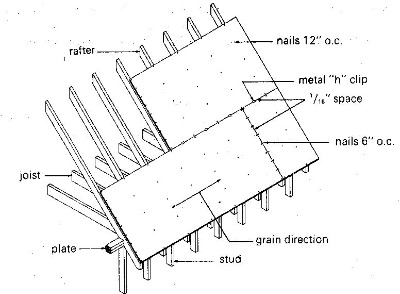Keep these tips in mind when roofing in hurricane areas.
Proper intallation of h clips on roof shaething.
This is what the apa engineered wood construction guide has to say about h clips.
The clips are inserted over the edges of the adjacent plywood panels to reduce deflection of the panel edges between the framing members and are most commonly used for roof sheathing.
The connection between the roof sheathing and the structure is a vulnerable point that is known to fail during a hurricane.
Check the nailing surface is level step 2.
If you re fastening 1 2 inch or 5 8 inch zip system roofing panels to rafters or trusses on the typical 16 inch or 24 inch spacing h clips aren t needed.
For 7 16 inch zip system panels huber engineered woods requires panel edge support blocking or approved edge clips if the on center spacing of the framing members exceeds 16 inches.
One or two h clips will often allow a longer span between roof trusses rafters.
Check building code requirements for installation of panel edge clips.
Properly fasten panels including fastening and spacing hints step 4.
A 1 8 inch space between adjacent panel end and edge joints is recommended unless panel manufacturer indicates otherwise.
Plywood clips also referred to as h clips or panel edge clips are small metal brackets placed between the unsupported edges of plywood sheathing to effectively reduce the support spacing and stiffen the plywood.
H clips are also necessary for other wood panel thickness and span combinations.
Their installation diagram also shows h clips although tongue and groove edges or blocking is noted as an alternative in the text above.
During a hurricane the strength of the sheathing on the roof can greatly impact the homes ability to weather the storm.
A low slope roof below 2 12 pitch at the same span is an exception however and an h clip is specified.
How many clips you install is completely up to you.
If the h.
For improved performance consider thicker roof sheathing panels panel edge clips or panels with tongue and groove edges.
And scroll down to see more details on each with installation hints and tips below.
Cover sheathing with.
Ventilate the roof according to current building codes step 3.

